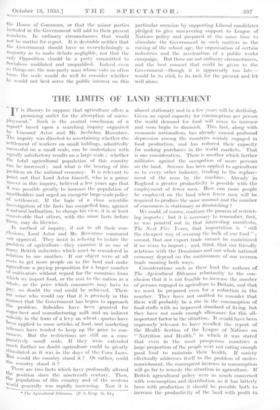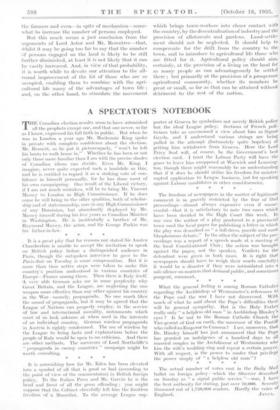THE LIMITS OF LAND SETTLEMENT
C. IT is illusory to suppose that agriculture offers a promising outlet for the absorption of unem- • Ployment." Such is the central conclusion of a report* based upon a searching inquiry organised by Viscount Astor and Mr. Seebohm Rowntree. The inquiry was directed to ascertaining whether the settlement of workers on small holdings, admittedly successful on a small scale, can be undertaken with equally satisfactory, results on a large scale ; whether the total agricultural population of this country can be increased ; and what is the bearing of this Problem on the national economy. It is relevant to Point out that .Lord Astor himself, who is a prime mover in this inquiry, believed a few years ago that it was possible greatly to increase the population of smallholders and urged an energetic large-scale policy of settlement. If the logic of a close scientific investigation of the facts has compelled him, against a natural inclination, to change his view, it is at least conceivable that others, with the same facts before them, may do likewise. In method of , inquiry, if not in all ,their con- elusions, Lord Astor and Mr. R.owntree command our apprOval. They insist in refusing to isolate the Problem of agriculture—they examine it as one of niany British industries which must be considered in relation to one another. If our object were at all costs to get more people on to the land and make agriculture a paying proposition for a larger number of cultivators without regard for the countries from Which we import food, or the cost to the nation as a Whole, or the price which consumers may have to Pay, no doubt the end could be achieved. There are some who would say that it is precisely in this ;banner that the Government has begun to approach the problem. Subsidies have been granted for sugar-beet and manufacturing milk and an indirect Subsidy in the form of a levy on wheat ; quotas have been applied to some articles of food, and marketing schemes have tended to keep up the price to con= samers. But the restrictions are still on a corn- Paratively •small scale. If they were extended nnieli further no doubt agriculture could be greatly stimulated as it was in the days of the Corn Laws. But would the country stand it ? Or rather, could the country stand it ? • There are t\vo facts which have profoundly altered the position since the nineteenth century. Then, the Population of this country and of the western World generally was rapidly increasing. Now it is * The Agricultural Dilemma. ' (P. S. King. 2s. 6d.) almost stationary and in a few years will be declining. Given an equal capacity for consumption per person the world demand for food will cease to increase and soon begin to diminish. This fact, along with economic nationalism, has already caused profound depression among the countries mainly engaged in food production, and has reduced their capacity for making purchases in the world markets. That is one consideration. There is another which further militates against the occupation of more persons on the land. Science has been applied to agriculture as to every other industry, tending to the replace.- merit of the man by the machine. Already in England a greater productivity is possible with the employment of fewer men. How can more people be employed on the land when fewer men will be required to produce the same amount and the number of consumers is stationary or diminishing ?
We could, of course, continue the process of restrict- ing imports ; but it is necessary to remember, first, as was pointed out in that interesting manifesto, The Next Five Years, that importation is " still the cheapest way of securing the bulk of our food " ; second, that our export trade cannot be maintained. if we cease to import ; and, third, that our friendly relations with the Dominions and our whole national economy depend on the continuance of our oversea trade running both ways. Considerations such as these lead the authors of The Agricultural Dilemma reluctantly to the con- clusion that it is not feasible to increase the number of persons engaged in agriculture in Britain, and that • we must be prepared even for a reduction in the number. They have not omitted to consider that there will probably be a rise in the consumption of food-stuffs with an improved standard of living, but they have not made enough allowance for this all- important factor in the situation. It would have been supremely relevant to have ,recalled the report of the Health Section of the League of Nations on " Nutrition and Health," in which it was stated that even in the most prosperous countries a large proportion of the people were not eating enough good food to maintain their health. If society effectually addresses itself to the problem of under- nourishment, the consequent increase in consumption will go far to remedy the situation in agriculture. If British agricultural policy were as much concerned with consumption and distribution as it has latterly been with production it should be possible both to increase the productivity of the land with profit to
the farmers and even—in spite of mechanism—some- what'tO increase the number of .persons employed.
But this much seems a just conclusion from the arguments of Lord Astor and Mr. Rowntree—that, 17T111St it may be going too far to say that the number cif persons engaged on the land is likely to be still further diminished, at least it is not likely that it can be vastly increased. And, in view of that probability, it is worth while to devote our attention to the all- round improvement of the lot of those who are so occupied, enabling them to combine with the agri- cultural life many of the advantages of town life ; and, on the other hand, to stimulate the movement
which brings town-workers into closer contact with the country; by thcdecentralisation of industry and the provision of allotments and gardens. Land-settle- ment should not be neglected. It should • help to compensate for the drift from the country to' the town, and to introduce to agricultural life thOse who are fitted for it. Agricultural policy should aim, certainly, at the provision of a living on the land for as many people as can advantageously be settled there ; but primarily at the provision of a prOsperons agricultural community, whether its numbers be great or small, so far as that can be attained without detriment to the rest of the nation.



























































 Previous page
Previous page